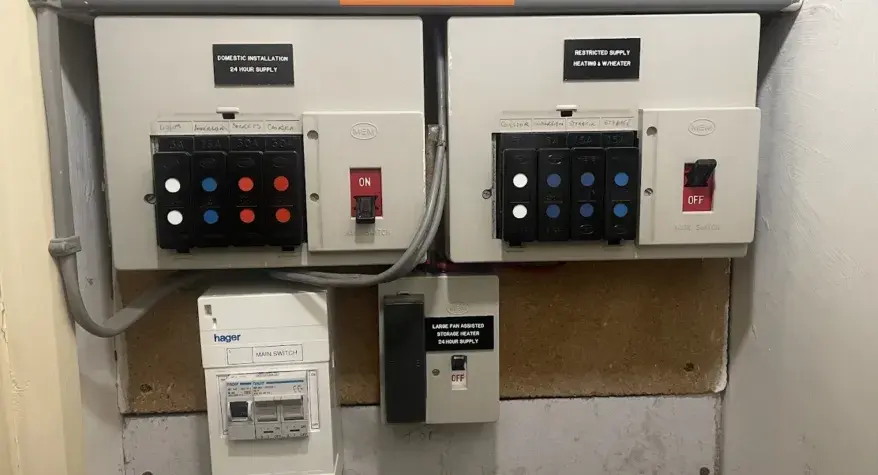Over the years working around Norwich, I’ve seen just about every type of electrical fault a home can throw at me — from sockets that spark when you plug the hoover in, to outdoor lights that only work when it’s raining (yes, really).
Common Electrical Faults I Find in Norwich Homes (and How to Prevent Them)
Most of these faults start small and go unnoticed, but left too long they can lead to bigger problems — tripping circuits, blown fuses, or even fire risks. The good news is, many of them are easy to prevent with regular checks and a bit of know-how.
Here are some of the most common issues I come across in Norwich homes, and what you can do to avoid them.
Loose or Overheated Connections
One of the top causes of tripping circuits is loose connections.
Over time, screws in sockets, switches, and light fittings can work loose from vibration, heat cycles, or just age.
You might notice:
- Flickering lights
- Warm switches or plugs
- A faint buzzing sound when things are turned on
If you ever spot scorch marks around a socket or switch, switch off that circuit immediately and get it checked.
When I do a routine EICR (electrical safety inspection), I always test for these — it’s one of the simplest faults to fix, and one of the most common.
Ageing or Damaged Wiring
Many homes in Norwich still have wiring from the 1970s or 80s. It might look fine from the outside, but insulation can break down with age, especially in lofts or under floors.
Old rubber or fabric-sheathed cable should always be replaced — it’s no longer compliant with modern safety standards.
Warning signs to look out for:
- Frequent circuit trips
- A burning smell near sockets
- Old-style round pin plugs or brown bakelite fittings
If you’re unsure how old your wiring is, an EICR is the best way to find out. I can test every circuit and let you know if anything needs attention.
Outdated Fuseboxes Without RCD Protection
Your fusebox is designed to protect you — but older units simply can’t react fast enough to modern electrical faults.
Modern Fusebox consumer units with RCBOs and surge protection will trip in milliseconds, keeping you and your home safe.
I still see a lot of rewireable fuseboards in Norwich homes — those little wire cartridges that have to be replaced when they blow. They’re not unsafe by themselves, but they offer much less protection than current standards.
If yours is showing its age, it’s worth upgrading before it causes trouble.
Outdoor Electrics and Water Ingress
Damp and electrics never mix, but outdoor sockets and lighting often take the brunt of Norwich’s weather.
Common issues include:
- Cracked outdoor sockets
- Garden lights filling with water
- Damaged cables chewed by pets or wildlife
All outdoor electrics should have at least an IP65 rating and be protected by an RCD. If your outside sockets are older, I can test and replace them quickly for peace of mind.
I recommend using Hager accessories for a smart, durable finish — they hold up really well against our weather.
Overloaded Circuits
Especially in winter, we all plug in a few extra things — heaters, dryers, and festive lights. The trouble is, those all draw a lot of power.
If you find your fusebox tripping when multiple appliances are on, it’s a sign your circuit is at capacity. Avoid using extension leads for high-load items like heaters or kettles.
I can add extra sockets or even split circuits if you’re finding power is stretched too thin — it’s a quick job that makes a big difference.
Quick Tips to Prevent Electrical Faults
| Fault: | Prevention Tip: |
| Loose connections | Have sockets and switches checked every few years |
| Ageing wiring | Book an EICR every 10 years (5 for rentals) |
| Old fusebox | Upgrade to a modern Fusebox RCBO board |
| Outdoor electrics | Use IP65-rated fittings with RCD protection |
| Overloaded circuits | Spread out appliances and unplug when not in use |
FAQs
Q: My fusebox keeps tripping — is that dangerous?
A: Not always, but it’s a sign something isn’t right. RCDs trip to protect you. It’s best to get it checked so the cause can be found safely.
Q: Can I replace a socket or switch myself?
A: Legally, yes for minor work — but if you’re not confident, it’s safer to have it tested afterwards to ensure the circuit’s properly earthed.
Q: Do you check outdoor electrics too?
A: Absolutely — I include outdoor circuits and garden lighting as part of any inspection or fault-finding job.
Q: Do you cover outside Norwich?
A: Yes, I work right across Norwich and nearby areas — Wymondham, Hethersett, Cringleford, Thorpe St Andrew, Sprowston, and Brundall.
Need a Hand Fixing or Testing a Fault?
If you’re having electrical issues or just want peace of mind before winter, get in touch with Norfolk Current Ltd, your trusted local electricians in Norwich and the surrounding villages.





